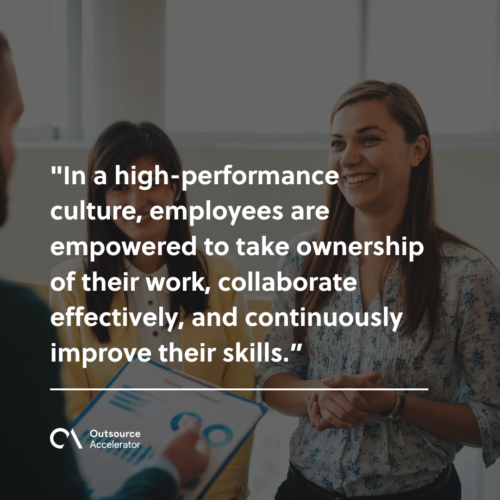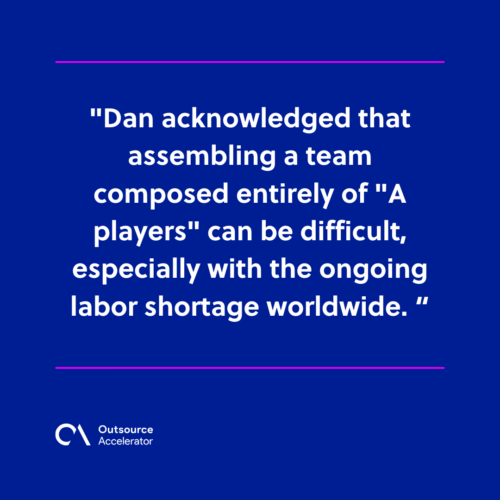What building a high-performance culture looks like today

Tools, products, and customers make up a huge portion of a company’s success.
However, it would not be possible without a successful team behind it. A high-performing team, whether in-house, remote, or offshore, works together to help reach every organizational target and maintain a firm’s good performance and competitive edge.
Building a high-performance culture is the key to achieving this. While most leaders think having only the best talents is how to build their culture, more successful teams would think otherwise.
Dave Roggenkamp of Set Up My Offshore tackles building a high-performance culture in today’s environment.
What is a high-performance culture?
A high-performance culture is an environment within an organization where employees are motivated, engaged, and committed to achieving exceptional results.
Having a high-performance culture goes beyond just meeting targets. It is about consistently striving for excellence, pushing boundaries, and achieving high productivity levels.
In a high-performance culture, employees are empowered to take ownership of their work, collaborate effectively, and continuously improve their skills.

Characteristics of a high-performance culture
Several key factors characterize a high-performance culture:
Common goals
In a high-performance culture, employees clearly understand what is expected of them in terms of the organization’s overall objectives. They get their work done and know the purpose of it.
This clarity enables them to align their efforts toward achieving those goals.
Accountability and responsibility
Employees in a high-performance culture take ownership of their work and are accountable for the outcomes. They understand that their contributions impact the organization’s success and embrace the responsibility that comes with it.
At the same time, managers take responsibility for proper workload management according to their teams’ capabilities and skills.
Continuous learning and development
Organizations with a high-performance culture prioritize the growth and development of their employees. They provide opportunities for learning, training, and mentorship to enhance skills, knowledge, and abilities.
Empowerment and autonomy
In a high-performance culture, employees are given the autonomy to make decisions and take initiative. They are empowered to innovate, solve problems, and make meaningful contributions to the organization’s success.
Collaboration and Teamwork
A high-performance culture promotes effective collaboration and teamwork.
Employees work together, leveraging each other’s strengths and supporting each other to achieve common goals. Each team shows high employee engagement and willingness to keep each other’s spirits up.
This collaboration fosters a sense of camaraderie, trust, and mutual respect among team members.
An outsourcing leader’s insights into building a high-performance culture
Set Up My Offshore (SUMO) is committed to providing top-notch offshore staff for Australian businesses. Given this objective, they take pride in building a high-performing culture to achieve this.
Per Dan, the firm “often [sees] the other side of the coin in terms of [a client’s] growth journey,” both from a staffing and business growth perspective. Through this, he observed that more companies take “a staff-led ecosystem,” regardless of company size.
Dan shares some of his insights in building a high-performance culture below.
Building a diverse team
Dan addressed the distinction between high-performing employees and high-performing companies.
Dan acknowledged that assembling a team composed entirely of “A players” can be difficult, especially with the ongoing labor shortage worldwide. He implied it is acceptable to have a mix of skill sets and risk levels within the team.
He mentioned businesses should “question when they’re looking at any staffing decision, that people systems and processes, a triad relationship, and consider that and working towards high performance.”
Regarding the recruitment process, Dan highlighted the importance of aligning the client organization’s culture and values with the individual candidates’ drivers and motivations.

Implementing a hybrid setup
Dan emphasized the need to find a balance between remote and in-office work.
Per Dan, SUMO has adopted a hybrid model, enabling employees to choose between working from home or the office. He mentioned that their offshore operations “have a similar model to [the operations] in Australia,” and they encourage their clients to support it.
At the same time, Dan acknowledged the disconnect the employees might feel when working remotely.
He stressed the significance of in-person interactions in building a strong sense of community among team members to increase their loyalty.
Integrating AI into processes
Dan firmly implied that AI and technology represent significant opportunities “when harnessed the right way.” He emphasized the importance of understanding the potential benefits and advancements that AI can bring to the accounting industry.
According to Dan, AI is not poised to replace accountants but to complement their work by automating some of their tasks.
Furthermore, Dan pointed out that AI and technology can help accountants transition from traditional accounting tasks to more strategic roles. This includes providing business advisory services.
Building a high-performance culture through offshoring
While offshoring is often associated with cost savings, it can also be leveraged to build a high-performance culture.
Offshoring allows organizations to tap into a global talent pool and harness the expertise of professionals in different geographical locations. This diversity of talent can contribute to a high-performance culture by bringing in fresh ideas, diverse perspectives, and specialized skills.
Set Up My Offshore, a renowned offshore accounting provider, is committed to helping Australian businesses with this.
SUMO caters to two types of clients:
- B2C – This model is designed for clients new to offshoring and prefers simplicity. It offers a fixed monthly fee that covers all aspects of the outsourcing service, including staff wages, insurance, healthcare, and social activities.
- B2B – The B2B model is suitable for clients with larger teams. It offers a month-by-month invoice, which may vary based on the activities and initiatives in a particular month.
Visit the company’s website to learn more about their services. At the same time, listen to episode 463 of the OA podcast.







 Independent
Independent




